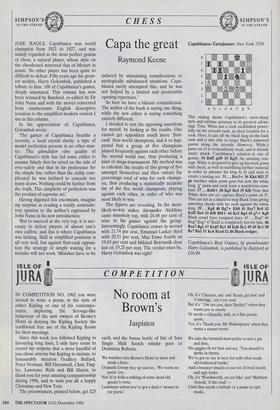SIMPSON'S
IN-THE-STRAND
SIMPSON'S
IN-THE-STRAND
felr.)
CHESS
Capa the great
Raymond Keene
JOSE RAOUL Capablanca was world champion from 1921 to 1927, and was widely regarded as the most perfect genius of chess, a natural player, whose style on the chessboard mirrored that of Mozart in music. No other player has been quite so difficult to defeat. Fifty years ago his great- est acolyte, Harry Golombek, published a tribute to him: 100 of Capablanca's games, deeply annotated. This volume has now been reissued by Batsford, re-edited by Dr John Nunn and with the moves converted from cumbersome English descriptive notation to the simplified modern version I use in this column.
In his appreciation of Capablanca, Golombek wrote: 'The games of Capablanca breathe a serenity, a lucid crystal clarity, a type of model perfection present in no other mas- ter. This splendidior vitro quality of Capablanca's style has led some critics to assume falsely that he erred on the side of over-safety and that in his preference for the simple line rather than the richly com- plicated he was inclined to concede too many draws. Nothing could be further from the truth. This simplicity of perfection was the product of supreme art.'
Having digested this encomium, imagine my surprise at reading a totally contradic- tory opinion to the author's expressed by John Nunn in his new introduction: 'But to succeed at the very top, it is nec- essary to defeat players of almost one's own calibre, and this is where Capablanca was lacking. Skill in simplified positions is all very well, but against first-rank opposi- tion the strategy of simply waiting for a mistake will not work. Mistakes have to be induced by stimulating complications or strategically unbalanced situations. Capa- blanca rarely attempted this, and he was not helped by a limited and predictable opening repertoire.'
So here we have a blatant contradiction. The author of the book is saying one thing, while the new editor is saying something entirely different.
I decided to test the opposing assertions for myself, by looking at the results. One cannot get opposition much more 'first- rank' than world champions, and it so hap- pened that a group of five champions played frequently against each other before the second world war, thus producing a kind of mega-tournament. My method was to calculate the results of this group of five amongst themselves and then extract the percentage total of wins for each champi- on, thus producing a statistically accurate list of the five world champions, playing against each other, in order of who was most likely to win.
The figures are revealing. In the most- likely-to-win stakes Alexander Alekhine came massively top, with 24.48 per cent of wins in his games against the group. Interestingly, Capablanca comes in second with 21.74 per cent, Emanuel Lasker third with 20.51 per cent, Max Euwe fourth on 19.83 per cent and Mikhail Botvinnik clear last on 19.23 per cent. The verdict must be, Harry Golombek was right! Capablanca—Tartakower: New York 1924.
This ending shows Capablanca's razor-sharp style and sublime accuracy to its greatest advan- tage. True, White has a rook established power- fully on the seventh rank, an ideal location for a rook. Here, it cuts off the black king on the back rank and is also able to target Black's unmoved pawns along the seventh. However, White's pawn on c3 is tremendously weak, and is already under attack. Capablanca's solution is one of genius. 34 Bxf5 gxf5 35 Kg3! An amazing con- cept. White is prepared to give up his weak pawn with check, as well as sacrificing further material in order to advance his king to f6 and start to create a mating net. 35 ...Rxc3+ 36 ICh4 Rf3 37 g6 Another white pawn goes but now the white king, `g' pawn and rook form a murderous com- bine. 37 ...Rxf4+ 38 Kg5 Re4 39 Kf6 Note that White does not yet capture Black's pawn on f5. This can act as a shield to stop Black from giving annoying checks with his rook against the white king. 39 ...Kg8 40 Rg7+ K.118 41 Rxc7 Re8 42 Kxf5 Re4 43 Kf6 1114+ 44 Ke5 Rg4 45 g7+ Kg8 Black could have resigned since 45 ... Rxg7 46 Rxg7 Kxg7 47 Kxd5 is completely lost for him. 46 Rxa7 Rgl 47 Kxd5 Rd 48 Kd6 Rc2 49 d5 Rd 50 Re7 Hal 51 Kc6 Rxa4 52 d6 Black resigns.
Capablanca's Best Games, by grandmaster Harry Golombek, is published by Batsford at £16.99.


















































































































 Previous page
Previous page